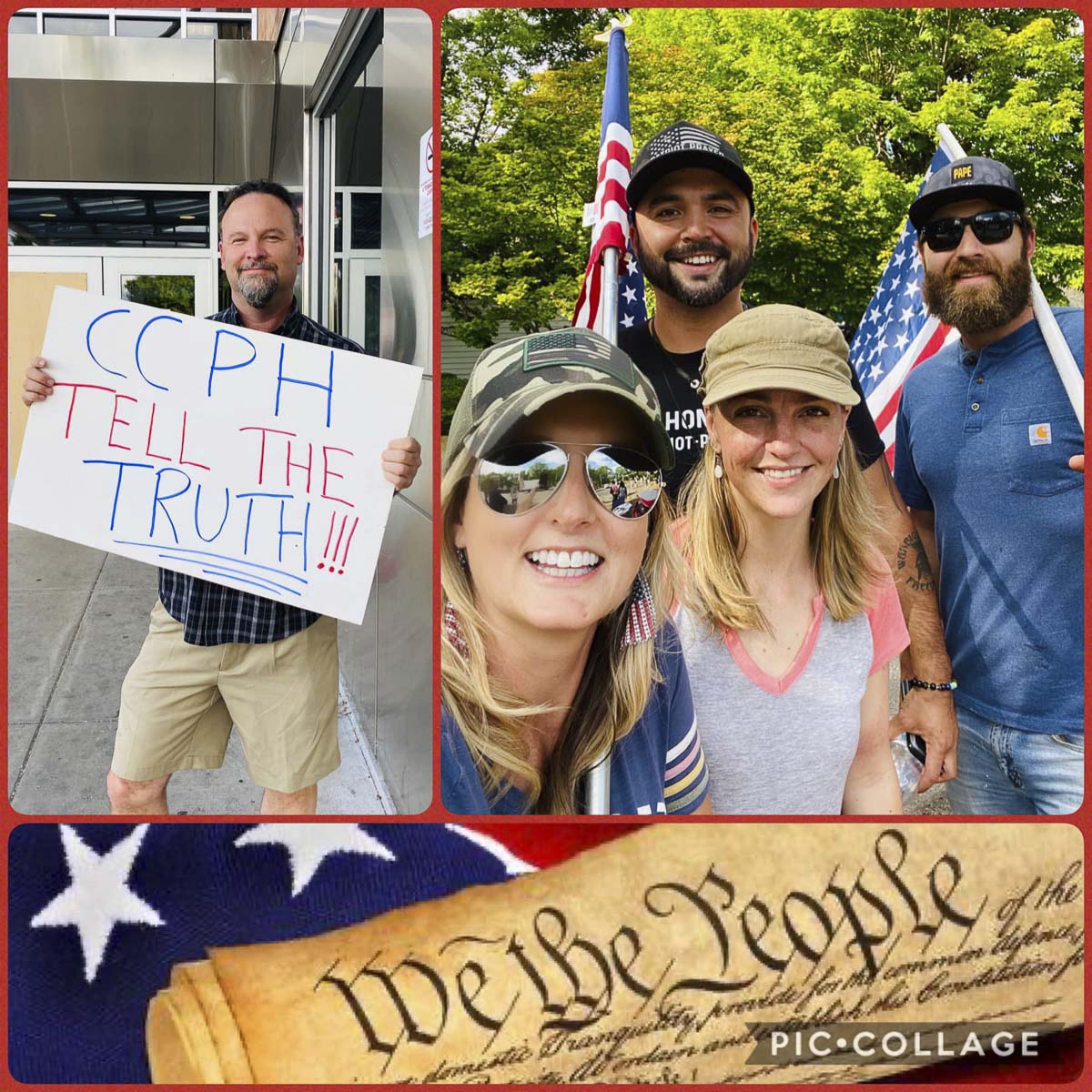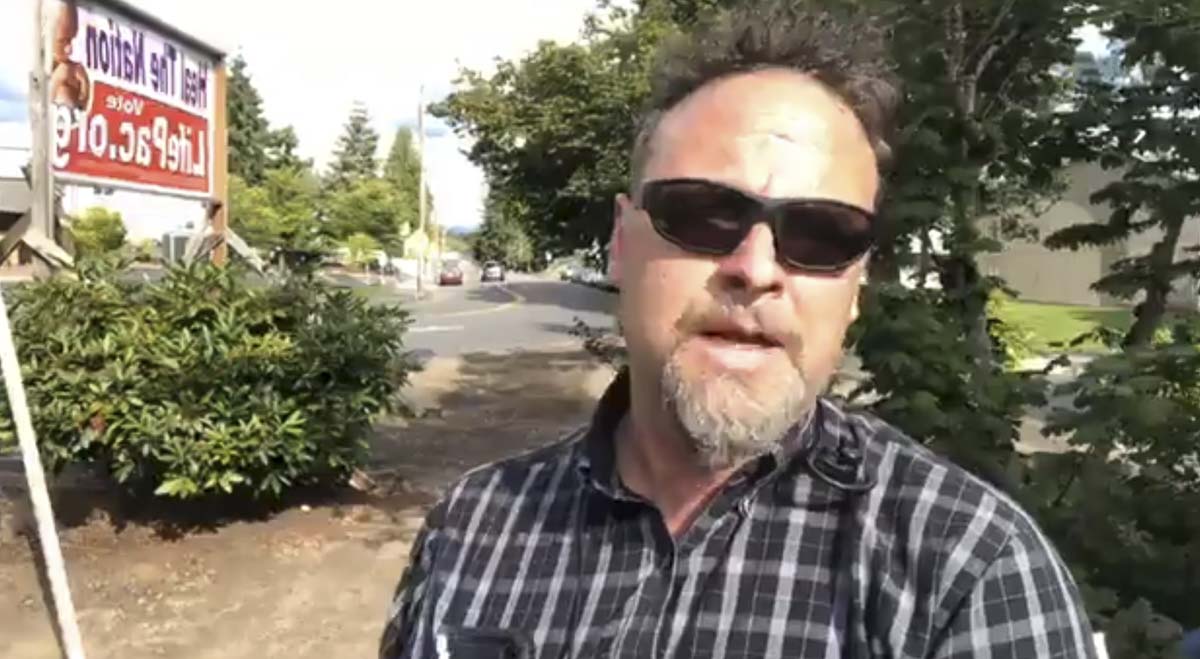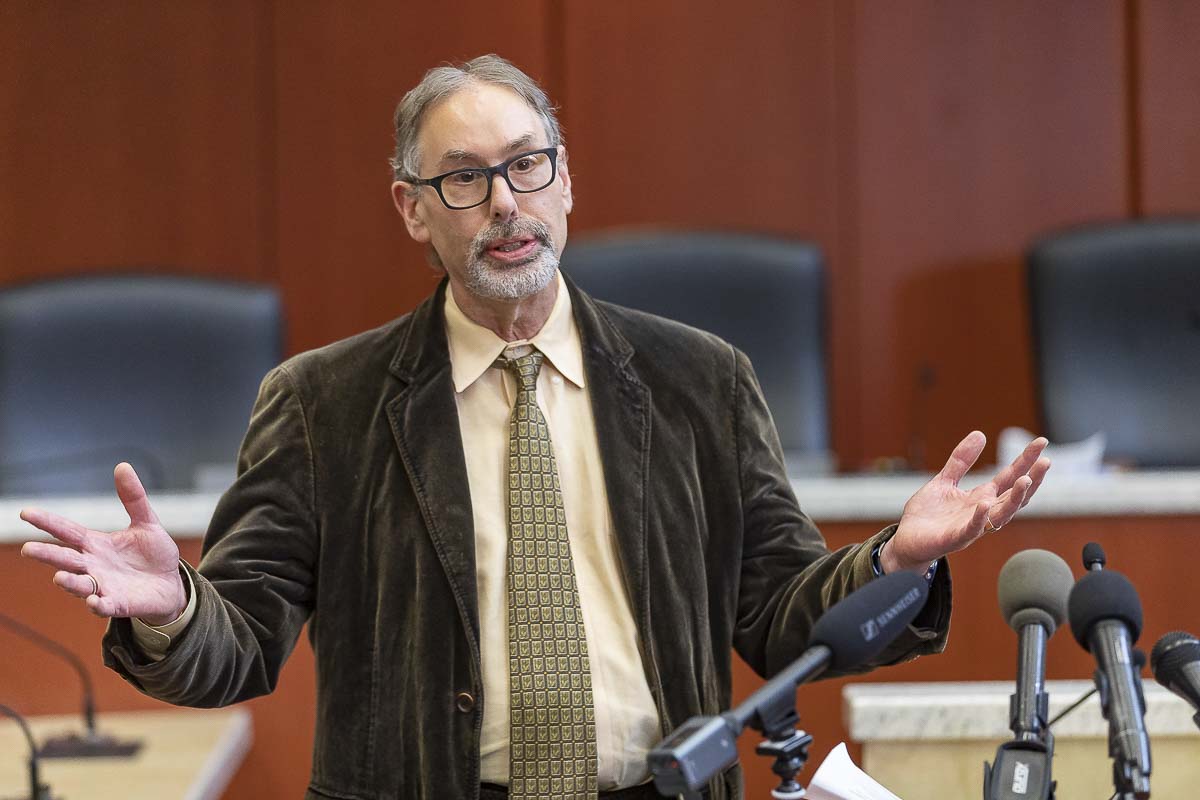The group alleges the county is intentionally inflating cases, deaths, and hospital data
VANCOUVER — Are the numbers of COVID-19 cases in Clark County really spiking? Are people dying from the disease, or simply with it? Is the hospitalization data accurate?
These are just some of the questions posed by a group of protesters who have been gathering at various places in recent weeks. Sometimes to protest the treatment of a Vancouver pet groomer charged with violating the governor’s lockdown order, sometimes to decry the mask mandate as evidence of a tyrannical government run amok.

On Thursday, at least two dozen people showed up along Fourth Plain, near the Veteran’s Administration building, and marched to the doors of the Clark County Public Health building.
Among them were Kelli Stewart, who started the Facebook group People’s Rights Washington, Joey Gibson of Patriot Prayer, and Rob Anderson, who is known online as The Recovering Pastor.
“The county is not willing to detail or give out the underlying health concerns,” Anderson said in an interview with Clark County Today before the march. “And the reason why that’s important is because how they define COVID death.”
Anderson, like most of the people who showed up carrying signs and flags on Thursday, believes the death toll likely includes those who died of things unrelated to COVID-19, but are added to the total if they simply tested positive at some point.
“You know, George Floyd, when he was murdered, he then tested positive for COVID,” Anderson says. “If that had happened in Clark County, taking away all the media, he would have been number 30. He would have been counted as a COVID death based on that definition.”
Clark County Public Health Officer, Dr. Alan Melnick, spoke with Clark County Today about many of the allegations made by the protesters. He points out that they don’t label any COVID-positive death as being caused by the virus, only that it is a “COVID associated death.”

The state Department of Health then reviews all death certificates in order to determine the actual cause of death, Melnick says, and would remove anything not directly related to COVID-19 from their total.
“At this point in Clark County, the state has not removed any COVID associated deaths from the total,” Melnick noted.
In fact, he said, it’s more likely that there are deaths earlier this year that were labeled as being caused by pneumonia which may have actually been due to COVID-19, so the current count may be low.
“Nobody’s out there to exaggerate the number of COVID-19 associated deaths,” Melnick adds. “We’re trying to be as accurate as we can about it.”
When Anderson and his group arrived at the county Public Health building shortly after 4 p.m. on Thursday, they found the building largely empty, with extra security around the building. They accused the health department of closing early when they caught wind of the protest.
“This is no way for a ‘Public’ Health Dept to operate,” he wrote in a letter to Clark County Chair Eileen Quiring following the protest.
Anderson and others who attended the protest say they also believe the county is being misleading in how it reports hospitalization data, alleging that most people who are admitted now are being tested for the virus, which could lead to inflated numbers.
“Someone could be in delivering a baby, have an aneurysm, cancer, whatever it is. Something that’s completely unrelated,” says Anderson. “And, based on their definition, the public thinks that they have COVID-19 or whatever.”

Melnick says it’s true that most people being admitted now are tested for the virus, but they are also seeing an increase in people with symptoms consistent with COVID-19.
Aside from that fact, he says, they’re required by law to report any positive test, as are hospitals..
“There’s a whole list of notifiable conditions, and COVID-19 is on the list,” Melnick says. “When a physician sees the lab has a positive test, or the hospital is aware of an admission with COVID-19, they’re required by law to report it.”
What they’re not required to report, Melnick adds, is whether the person is specifically in the hospital because of the COVID-19 infection.
In some ways, though, it doesn’t matter, he says, since someone with a positive COVID-19 diagnosis is going to need to be treated with precautions, including isolation and more use of PPE, whether they’re being treated directly for the virus, or some other medical issue.
When it comes to masks, the protesters chanted “it’s not about the virus. It’s about compliance!”
Stewart, in her live stream, said she believes the mandate represents a gross overreach of government authority.
“We will not comply with lawlessness, we will not comply with abuse,” she said. “That’s not the American spirit, that’s the Chinese spirit, and we are not Chinese, we are Americans. If they want compliance without anybody asking questions, then they better figure out a way to swap out flags.”
Melnick says, as someone who has studied infectious diseases for 30 years, it frustrates him to see a scientific issue become one centered around political ideology.
“One of the things that concerns me the most is we take something that’s a biological phenomenon, where we’re learning more about this disease, and it’s turned into some sort of political issue,” says Melnick. “Which it’s not. You know, we’re trying to prevent disease transmission.”
The COVID-19 pandemic has presented a unique challenge to health departments across the country at every level.

The system simply wasn’t designed to provide the level of contextual detail many people are currently demanding about this pandemic, Melnick says, especially when the levels of public skepticism are so high.
“We’re trying to be as accurate as possible with the science,” Melnick says, while admitting that there are complexities in doing so. “I do want people to wear masks, but I’m gonna be honest about what they do and what they don’t do. I’m not gonna say ‘you put on a mask and you’re 90 percent protected,’ because I don’t have evidence that it does that. But I do have evidence that putting on a mask substantially reduces your risk of passing the disease on to other people. That may not be as effective an argument, but it’s a truth.”
Obviously, the protesters don’t agree completely.
“It’s one thing when you’re dealing with people who, you know, ‘I’m answering your questions freely here,’” says Anderson. “But you get into situations where you have to ask the right way, in order to get the right answers, and if you don’t, you get kind of slippery answers.”




